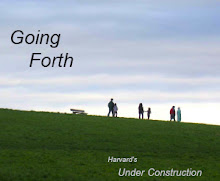 The New York Times has the full text of Pope Benedict XVI's address tonight to the bishops of the United States in the crypt of the Basilica of the National Shrine of the Immaculate Conception, as well as his answers to the three questions the bishops posed to him.
The New York Times has the full text of Pope Benedict XVI's address tonight to the bishops of the United States in the crypt of the Basilica of the National Shrine of the Immaculate Conception, as well as his answers to the three questions the bishops posed to him.Most of the coverage of this address in the mainstream media will undoubtedly and understandably focus on the pope's words about the clergy sexual abuse scandal. Pope Benedict XVI reiterated that the situation was a source of "deep shame" for him and for the entire Church, and he acknowledged that the Church's response was "sometimes very badly handled." I'm glad that the pope addressed this scandal which has rocked the Church, but I think I'll leave it to others to discuss and debate the significance of what he said about it. I will simply pray that "this evil" (the pope's words) of clergy sexual abuse will be definitively eradicated, and that the victims may find healing.
While the abuse scandal is obviously an extremely important topic, and while it was one of the major issues addressed in Pope Benedict XVI's speech, it would be a shame if the rest of the pope's message were overlooked, as I suspect it will be my most people. The pope issued a challenge to all Americans, and especially to Catholics, to embrace a vibrant, living faith that embraces all areas of life. This is a message I think we all need to hear, again and again, for as long as we live. Here are a few highlights:
"It is in this fertile soil, nourished from so many different sources, that all of you, Brother Bishops, are called to sow the seeds of the Gospel today. This leads me to ask how, in the twenty-first century, a bishop can best fulfill the call to 'make all things new in Christ, our hope'? How can he lead his people to 'an encounter with the living God', the source of that life-transforming hope of which the Gospel speaks (cf. Spe Salvi, 4)? Perhaps he needs to begin by clearing away some of the barriers to such an encounter. While it is true that this country is marked by a genuinely religious spirit, the subtle influence of secularism can nevertheless color the way people allow their faith to influence their behavior. Is it consistent to profess our beliefs in church on Sunday, and then during the week to promote business practices or medical procedures contrary to those beliefs? Is it consistent for practicing Catholics to ignore or exploit the poor and the marginalized, to promote sexual behavior contrary to Catholic moral teaching, or to adopt positions that contradict the right to life of every human being from conception to natural death? Any tendency to treat religion as a private matter must be resisted. Only when their faith permeates every aspect of their lives do Christians become truly open to the transforming power of the Gospel.
. . .
"In a society which values personal freedom and autonomy, it is easy to lose sight of our dependence on others as well as the responsibilities that we bear towards them. This emphasis on individualism has even affected the Church (cf. Spe Salvi, 13-15), giving rise to a form of piety which sometimes emphasizes our private relationship with God at the expense of our calling to be members of a redeemed community. Yet from the beginning, God saw that 'it is not good for man to be alone' (Gen 2:18). We were created as social beings who find fulfillment only in love - for God and for our neighbor. If we are truly to gaze upon him who is the source of our joy, we need to do so as members of the people of God (cf. Spe Salvi, 14). If this seems counter-cultural, that is simply further evidence of the urgent need for a renewed evangelization of culture.
. . .
"Of course, what is essential is a correct understanding of the just autonomy of the secular order, an autonomy which cannot be divorced from God the Creator and his saving plan (cf. Gaudium et Spes, 36). Perhaps America’s brand of secularism poses a particular problem: it allows for professing belief in God, and respects the public role of religion and the Churches, but at the same time it can subtly reduce religious belief to a lowest common denominator. Faith becomes a passive acceptance that certain things 'out there' are true, but without practical relevance for everyday life. The result is a growing separation of faith from life: living 'as if God did not exist'. This is aggravated by an individualistic and eclectic approach to faith and religion: far from a Catholic approach to 'thinking with the Church', each person believes he or she has a right to pick and choose, maintaining external social bonds but without an integral, interior conversion to the law of Christ. Consequently, rather than being transformed and renewed in mind, Christians are easily tempted to conform themselves to the spirit of this age (cf. Rom 12:3). We have seen this emerge in an acute way in the scandal given by Catholics who promote an alleged right to abortion.
"On a deeper level, secularism challenges the Church to reaffirm and to pursue more actively her mission in and to the world. As the Council made clear, the lay faithful have a particular responsibility in this regard. What is needed, I am convinced, is a greater sense of the intrinsic relationship between the Gospel and the natural law on the one hand, and, on the other, the pursuit of authentic human good, as embodied in civil law and in personal moral decisions. In a society that rightly values personal liberty, the Church needs to promote at every level of her teaching — in catechesis, preaching, seminary and university instruction — an apologetics aimed at affirming the truth of Christian revelation, the harmony of faith and reason, and a sound understanding of freedom, seen in positive terms as a liberation both from the limitations of sin and for an authentic and fulfilling life. In a word, the Gospel has to be preached and taught as an integral way of life, offering an attractive and true answer, intellectually and practically, to real human problems. The 'dictatorship of relativism', in the end, is nothing less than a threat to genuine human freedom, which only matures in generosity and fidelity to the truth."


No comments:
Post a Comment